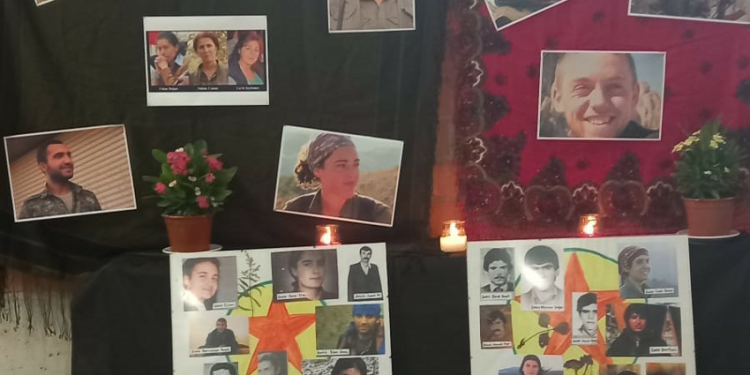CATALUNYA -This weekend (June 15-17) the 1st INTERNATIONALIST CONFERENCE OF THE CATALIAN COUNTRIES took place in the city of Barcelona, in the self-managed space La Lleialtat Santsenca. This is one of the many events that are taking place in the different territories of Europe with the aim of discussing and improving support and solidarity structures for Kurdish Democratic Confederalism, building dialogues from different experiences for the creation of a common path. The Conference was animated by representatives of the Academy of Democratic Modernity who, with the production of these conferences in different territories and in an interconnected way, propose to reinforce the democratic river of our histories.
On an altar, next to the main table where the talks took place, images of the martyrs were arranged, as is customary in the movement. Our s ehids are the living presence of resistance, of memory and of the purposes of the struggle for a more just and democratic society. July is the month of the sehids, because on July 14, 1982 (exactly 40 years ago) in the Amed prison, the Turkish state began a massive repression and torture of comrades who mobilized from inside the prison. A comrade decided to burn herself against the repressions of the Turkish state, this comrade left a message on the prison wall: Berxwedan jiyane(“Resistance is life”). Subsequently, four comrades shook hands and burned themselves, leaving the message: “whoever puts out our fire will put out the fire of Kurdistan”. This event left a mark in the memory of the struggle for Democratic Confederalism, the s ehids are not only sisters who gave their lives for a more just and democratic society, they are the path that reminds us every day that the struggle is daily, that we are not alone. The altar next to the talk table here in Catalunya is an expression of our bond with our sehids.
From the 15th to the 17th there have been talks and presentations by the solidarity committees. The last day we discussed the links between the proposal for Democratic Confederalism and the Catalan struggle. As in Kurdistan – and in Latin America -, the Catalans have suffered persecution and an attempt to erase their histories, their language, their traditions. The history that has been written by the hands of the dominant – the history of capitalist, patriarchal and colonial power – does not represent our peoples, their processes of resistance, the knowledge of women. For this, both in Kurdistan and in Catalonia, it is urgent to return to the history of democratic civilization, the democratic river, for a creative development of alternatives. Democratic Confederalism is not a commitment to social homogenization, rather it is the construction of democratic and, therefore, plural societies. For this, we learn the paths of social transformation, of our revolution, looking at the different trajectories of the compañeras. Internationalism, for this to be possible, is decisive.
In this ethical and political exercise, ethics being the source of our strength and politics the organization of life itself, our history is the main weapon of the Revolution. We must know our history, the history of our peoples, their processes of resistance to power, in the construction of the transformation that occurs now, in the present, in everyday life. A Kurdish comrade made it clear, during the event, that problems are going to appear in the process, but it is crucial that analysis and practice go hand in hand and that our differences are not reasons for fragmentation, but for riches, riches that create potential for a democratic revolution in Catalonia and in all the territories.
To look at history is to think about the linked past, present and future. We in the Bolivian Andes call this qhipnayra , an exercise of walking in the construction of the present with the past ahead, as a guide on our path. There will be no present, nor future, if we do not understand where we come from.




